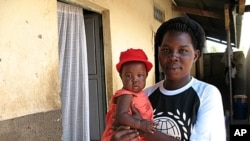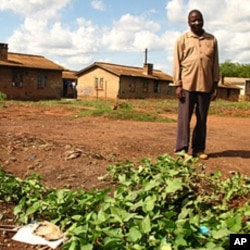The rebel Lord's Resistance Army and its leader, Joseph Kony, have moved into neighboring countries, but in Uganda, the 20-year war Kony waged has left a host of problems in its wake.
The people of northern Uganda are gradually emerging from a brutal 20-year war with Joseph Kony and the LRA, who were driven out of the country in 2006. But now, tens of thousands of people are finding themselves caught in a new kind of war -- this time to reclaim their own land.
During the war, about two million people were forced into camps for internally displaced persons, or IDPs. The camps are now officially closed, but when the people tried to go home, many found their ancestral land was occupied, or had been sold off.
Northern Uganda is home to the Acholi people. Steven Oola, a lawyer with the Kampala-based Refugee Law Project, says that in Acholi culture, land is collectively owned by the tribe or clan and cannot be sold.
“There was no commercialization of land, so there was no risk that someone else would come and buy your land. Before the conflict, there was no land sale in Acholi land. So people didn’t anticipate land would be a contentious issue,” Oola said.
But land has been a very contentious issue indeed. Part of the problem, says Oola, is that some people in the camps had sold their land. Others had forgotten where their traditional boundaries lay. But some of the land belonging to IDPs was the target of very deliberate land grabs.
Julian Hopwood, a land rights researcher for a local non-governmental organization, says that in some cases, members of the Ugandan military were involved.
“There’s many reports that senior figures in the military and others used displacement as an opportunity to acquire land, by means that may or may not have been technically legal,” Hopwood said.
In one high-profile case, the Ugandan government has been trying to allocate land to investors looking to plant a sugarcane plantation.
But for Jackie Aciro, the problem lies with her own family.
Aciro works as a housekeeper in Gulu, where she rents two tiny rooms with her husband and children. She longs to be able to work her husband’s land, but he is a war orphan who grew up in an IDP camp. When he tried to go home, he found his uncles had occupied the land and refused to allow him to cultivate there.
Aciro says she is worried about what this means for her family, particularly her son.
“If a father has no land, then a child also will have no land. For boys, you get married and your children also remain in that land. So if your father has no land, it’s not possible. Here in northern Uganda, the important thing is that you’re supposed to be with land,” Aciro said.
Tens of thousands of people in northern Uganda are in similar situations. Some have taken the matter to court. Others moved into cities. But Oola says that for many others, the solution was simply to stay in the camps. Trying to re-claim your property, he says, can be a dangerous affair.
“They started fighting, there was a lot of spearing, a lot of killing, a lot of tension, basically, brewing within the communities. We found some people were still in the camps because they tried to go back home, and they found that land was just too hot an issue. It’s a matter of life and deat,” Oola said.
Antony Odiya agrees. A local man involved in a land dispute of his own, he says that people often take the law into their own hands.
“Last week, there was a land wrangle between a neighbor. That neighbor planned to buy petrol, and then pour on the wall and the roof of the house, and then they burned those people inside the house. Three people died,” Odiya said.
Odiya’s land is being occupied by IDPs who have nowhere to go, and refuse to leave. He is renting a small house in Gulu for his wife and five children, but he says it is difficult there to make ends meet.
Land rights researcher Hopwood says the cities of northern Uganda are filled with landless people, and that many are barely able to survive.
“Gulu and Kitgum, particularly Gulu, have large populations of people on the economic margins. Some reports say the sex industry up here is substantial. And it seems to be the case that they are people who are unable to live on their land and access their land,” Hopwood said.
Aciro is hoping to buy a small plot of land in Gulu itself, where she can grow corn, cassava and sweet potatoes to feed her family. But, she says, losing her husband’s land has left her feeling helpless and confused.
“Show us our own land, the one for our father. We don’t want to farm any other land, but we want to see the one which belongs to our father. So right now I’m confused. I don’t know where to stand, or where to begin, where it’s going to end up,” Aciro said.
The Ugandan government is trying to solve the problem by issuing certificates for the land, which would clearly identify the owner. But Oola says that by making land easier to buy and sell, this goes against Acholi tradition, and only promises to make matters worse.







